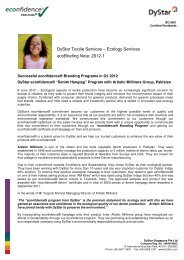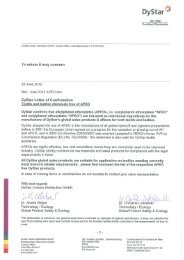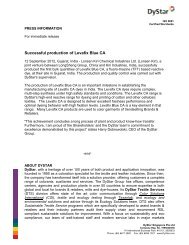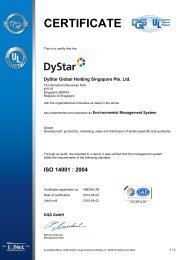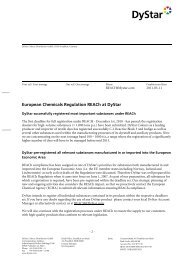Read the DyStar Sustainability Report 2011...
Read the DyStar Sustainability Report 2011...
Read the DyStar Sustainability Report 2011...
You also want an ePaper? Increase the reach of your titles
YUMPU automatically turns print PDFs into web optimized ePapers that Google loves.
Waste and<br />
wastewater<br />
treatment<br />
Environmental expenditure break up 2011<br />
86.20%<br />
13.80%<br />
O<strong>the</strong>r expenses<br />
Environmental fines and sanctions<br />
We are committed to complying with all applicable environmental<br />
laws and regulations wherever we operate.<br />
In 2011, <strong>the</strong>re were no identified incidents of significant environmental<br />
fines or non-monetary sanctions. There was however one unfortunate<br />
incident of a third-party truck accident in Brazil that resulted in chemical<br />
products spilling onto <strong>the</strong> road. The truck was carrying chemical products<br />
from at least two o<strong>the</strong>r companies in addition to <strong>the</strong> products from<br />
<strong>DyStar</strong>.<br />
Pursuant to a standard procedure, <strong>the</strong> local authorities have asked <strong>DyStar</strong><br />
to pay 24,000 Euros in fine. However, <strong>DyStar</strong> has appealed against<br />
<strong>the</strong> fine and is still awaiting a final decision from <strong>the</strong> authorities at <strong>the</strong> time<br />
of writing this report. <strong>DyStar</strong>’s position is that <strong>the</strong> company’s products<br />
classified as hazardous met <strong>the</strong> legal packaging requirements and did<br />
not spill during <strong>the</strong> accident. Some of <strong>the</strong> <strong>DyStar</strong> products that leaked<br />
in <strong>the</strong> accident were not classified products.<br />
“Our technological innovations have helped us<br />
reduce our emission intensity in <strong>2011.</strong> Our<br />
environmental integrity is integrated through<br />
<strong>the</strong> whole of our supply chain and our production<br />
colleagues are also increasing <strong>the</strong>ir environmental<br />
consciousness. As a result of <strong>the</strong>se efforts our<br />
production costs are reducing and we are able to<br />
manage our production more effectively.”<br />
Mr. Chen KeKe<br />
Deputy Manager, Process Technology Development - Wuxi China<br />
Environmental Initiatives in 2011<br />
Our facilities worldwide launched a number of initiatives in 2011<br />
aimed at improving environmental performance by reducing energy<br />
consumption, water use, waste and o<strong>the</strong>r resource.<br />
Key initiatives included:<br />
• Implement a direct heating process for <strong>the</strong> spray driers at our<br />
Gabus plant, Indonesia, to reduce heat losses and to save energy.<br />
• Build a new waste water treatment plant at our Reidsville plant,<br />
USA, to reduce waste water pollutants.<br />
• Continuously improve cleaning procedures for product changes<br />
at all production sites to reduce <strong>the</strong> amount of waste water and<br />
pollutants generated.<br />
• Continuously work on yield improvement with regard to physical<br />
and chemical production processes to reduce waste, waste water<br />
and energy consumption per unit of product.<br />
• Apply a wastewater recycling process wherever possible to<br />
increase <strong>the</strong> rate of water reuse at all production sites.<br />
• Increase employee awareness and change employee behaviour<br />
at all manufacturing sites to save energy and water and to reduce<br />
waste water generation.<br />
• Re-use waste material whenever possible inside <strong>the</strong> plants and to<br />
identify o<strong>the</strong>r industries which can safely re-use <strong>DyStar</strong>’s waste<br />
material ra<strong>the</strong>r than disposing it through land fill or incineration.<br />
Develop systems for ensuring controlled, safe and sustainable<br />
re-use of waste material.<br />
• Work on low energy waste gas treatment processing instead of<br />
<strong>the</strong>rmal oxidization to reduce <strong>the</strong> consumption of natural gas and<br />
thus, <strong>the</strong> emission of carbon dioxide.<br />
• Review <strong>the</strong> car policy at major production sites to reduce <strong>the</strong><br />
consumption of fuel and <strong>the</strong> emission of carbon dioxide.<br />
2011 <strong>Sustainability</strong> <strong>Report</strong> - <strong>DyStar</strong> Group 37







